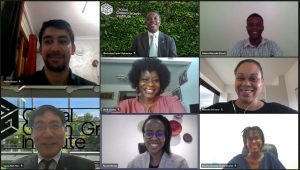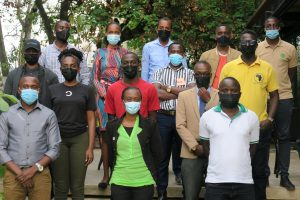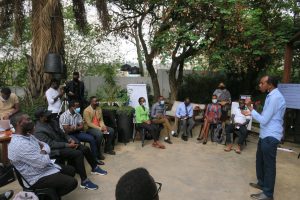
27th August 2021 , Kigali , Rwanda like many countries faces effects of climate change which has led to natural disasters and economic disruption. However, Rwanda has recognized the importance of innovation as a solution to the negative impact of climate change by committing to policy actions and implementation towards a green and climate resilient economic growth model. Rwanda currently boasts of a burgeoning entrepreneurship ecosystem that includes amongst others, incubation hubs, Innovation hubs, Accelerators, Co-Working space, and research centers all striving to take ideas to mature businesses. Yet, these laudable initiatives are yet to tackle the challenges faced by many startup businesses especially by the youth and women. Rwanda’s economic growth has been robust with an average GDP growth of 8% pre-pandemic. However, this growth has not translated to enough quality and sustainable employment for the growing youth of the country. This is a complex problem that matters to the growth of the economy because in a country of roughly 13 million population (NISR 2021), the youth within the ages of 14-35 makes up close to 40% of this population. Moreover, the government’s National Strategy for Transformation (NST1), which is a 7-year medium term strategy (2018-2024) included job creation as one of the key components of the economic pillar of the strategy. The target is to create 1.5 million productive and descent jobs by 2024 through off farm employment and expanding the possibilities within manufacturing, value addition of minerals, construction, tourism, information technology in a knowledge-based economy. Achieving this target would ensure that no one is left behind in the country’s growth as well as to consolidate the trust that the citizens have on their government. Yet, recent numbers from the quarterly Labor Force Survey of the National Institute of Statistics of Rwanda (NISR – Q3 2020) shows that even though there is an increase of 6.4% in off farm employment corresponding to the net job created of 120,978 between 2018 and 2019, there has been job loss in sectors like construction, tourism, human health and social work, information, and communication etc. The implication is that the year-on-year employment target would be missed unless drastic and innovative approaches are utilized to deconstruct the challenge. This challenge when solved will reduce the poverty level amongst youth and spur sustainable economic growth that is anchored on technological innovations.

The Global Green Growth Institute (GGGI) has signed an MOU with Youth Connekt Africa Hub & Fund (YCA) on key program and project activities to establish Rwanda Greenpreneurs Network. GGGI is also collaborating with Ministry of Youth and Culture , Rwanda National Youth Council, and other evolving incubation hubs within the startup ecosystem in Rwanda to support the Rwanda Greenpreneurs Network. This network that will develop and coordinate a framework that will connect the different entities that are working to support the young green entrepreneurs from concept stage to a sustainable business that contributes to meet the set targets in national development plan including the SDGs and NDCs. The Network will provide opportunities to strengthen and leverage youth collaborative and innovative abilities, utilizing the platform to link innovators and investors to identify potential partnership. Moreover, the network will create awareness within the existing startup innovation ecosystem through networking engagements, outreaches, and aligning policies to practical needs that benefits the support structure for entrepreneurs. The network will also provide the opportunity for the youth to contribute to the aim of the government of Rwanda which is to raise the profile of young people’s innovative solutions as a vehicle of change in Africa. The government of Rwanda is keen to support ideas and innovative solutions from young people aged between 15 – 35 years old (African Charter) by working with existing entities that can support to scale up green business solutions such as Youth Connekt Africa Hub & Fund. As a result, Global Green Growth Institute (GGGI seeks to establish a platform and network that could serve as a one stop center for youth development that includes different entities that offer unique business solutions as stated in the project outcome.

By establishing the Rwanda Greenpreneurs Network we want to enable a green “ecosystem” of support for young people. The core of this ecosystem will be (1) skill-building programs such as Greenpreneurs and Student Energy and Youth Climate Lab’s larger program offerings (2) investors and organizations financing youth-led projects, growing the green jobs sector, and supporting young people to access decent work in the green economy, and (3) a network that cultivates relationships, new collaborations, and a global knowledge-sharing platform.
The project will build structured Rwanda Greenpreneurs Network based upon GGGI’s Greenpreneurs work, by identifying the gaps and challenges in Rwanda to strengthen national co-ordination amongst youth innovation hubs, investors, mentors, start-ups and the green entrepreneurs. This will enhance their skills, knowledge and capacities in order to build inclusive viable start-ups and businesses that concurrently address challenges of unemployment, promote resilience, social inclusion, gender equality and self-sufficiency.
Moreover, this will help tackle climate change and environmental sustainability challenges. The project will develop a co-ordination platform along the entrepreneurship ecosystem and value chain, linking all the stakeholders involved in youth entrepreneurship and creating a system that can closely align with related green business policies and opportunities in Rwanda. This will ultimately create green jobs that is in line with NST1’s target of creating 1.5 million productive and descent jobs by 2024.

The project’s goal is to scale up the partnership within the region and support greenpreneurs through the Regional Green Innovation Fund. By signing an MOU with Youth Connect Africa Hub, the project will be grounded within an existing institution equipped with the mandate both in Rwanda and in the region, and this will ensure scalability and sharing of knowledge, lessons learned within a broader network that targets the critical mass of youth entrepreneurs. The project can be replicated in other cities (including secondary cities and satellite cities) in Rwanda. The expected results from the project will be consolidated and embedded within the existing collaboration institutions both in the public and private sector to ensure a continuous building of the required knowledge as well as linkages across the startup ecosystem to secure the needed resources to support business development by young greenpreneurs. GGGI and YCA Regional Hub & Fund will cooperate in the following areas:
i. Identify, document and share effective solutions, policies, and best practices to
advance youth in environmental sector;
ii. Strengthen the Eco-brigade model in Rwanda and support its expansion across
Africa in collaboration with the YouthConnekt Africa Hub;
iii. Organize knowledge sharing opportunities to create awareness, share findings,
lessons learnt with key stakeholders within the sector working groups;
iv. Support green entrepreneurship, green innovations, and sustainable and
inclusive youth development through platforms, webinars, events etc;
v. Connect youth to peers, resources, skills, and economic opportunities in the
environmental sector through digital platforms;
vi. Provide support to young green entrepreneurs and start-ups through capacity
building, trainings and mentoring;
vii. Empower youth to contribute to Africa’s green growth agenda and showcase
innovative solutions to environmental issues ; viii. Support relevant YCA and GGGI programmes and activities and design solution
to scale up innovations, build and accelerate green ventures across Africa.

GGGI has supported the development of greenpreneur participants in the past. These enterprises require additional and continued support on capacity development for their business to become sustainable and access to funding that will be facilitated by the project. GGGI’s niche in combining sustainability and entrepreneurship to create new green jobs in existing and emerging sectors would be crucial to increasing their knowhow and network. GGGI’s is also uniquely positioned to guide emerging greenpreneurs to access funds and systems in place in Rwanda that are designed to ease processes for new businesses. This support could be in the form of identifying entry barriers by young entrepreneurs in the market and to provide recommendations on how to improve the needed skills to thrive in the entrepreneurship ecosystem. The synergies with other GGGI activities include identifying opportunities for young entrepreneurs across different sectors where GGGI currently has ongoing projects including the building and construction sector, sustainable waste management, and sustainable mobility. Rwanda has several existing hubs and start-ups that have specific roles in supporting entrepreneurs with the necessary skills and knowledge, for example the Innovation City whose role is to attract and establish the needed ecosystem for entrepreneurship. This project when completed would become a platform that will create the necessary synergies by coordinating the different enterprises, start-ups, and innovation centers within the existing ecosystem to utilize tools and for the established network to scale up.